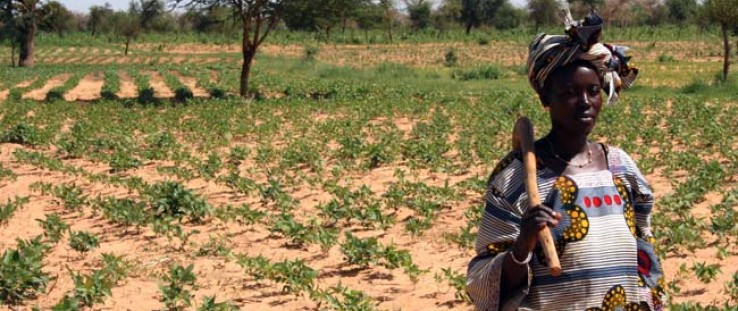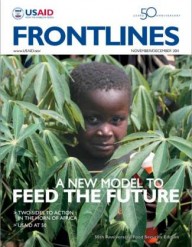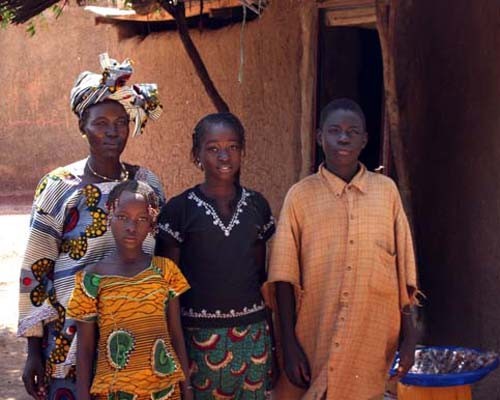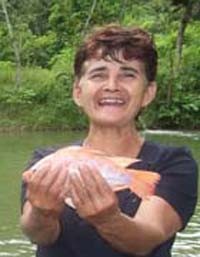 Malian Aïssata Konaté is president of her local women's group, supplying female farmers with high-yield seeds.
Agathe Diama, ICRISAT
Malian Aïssata Konaté is president of her local women's group, supplying female farmers with high-yield seeds.
Agathe Diama, ICRISAT
 Malian Aïssata Konaté is president of her local women's group, supplying female farmers with high-yield seeds.
Agathe Diama, ICRISAT
Malian Aïssata Konaté is president of her local women's group, supplying female farmers with high-yield seeds.
Agathe Diama, ICRISAT
The U.S. hunger and food security initiative, Feed the Future, is improving the lives of smallholder farmers by increasing food production, improving nutrition, expanding access to markets, and boosting incomes. Many of the farmers are women, who play vital roles in agriculture and food security. They participate in paid employment, trade, and marketing as well as many unpaid activities such as tending to crops and animals, collecting water and wood for fuel, caring for family members, and managing household consumption and food preparation.
But a woman's world is often laden with constraints—from less land ownership; to less access to credit, extension, and other services; and less ability to hire labor on their farms. Too often, these production constraints go unrecognized. Closing gaps in women's access to resources increases agriculture productivity and reduces hunger.
“When we liberate the economic potential of women, we elevate the economic performance of communities, nations, and the world,” Secretary of State Hillary Rodham Clinton said at a Sept. 19 U.N. General Assembly event highlighting women and agriculture.
Reaching female farmers is a top priority for Feed the Future to transform agriculture and achieve a sustainable, long-term impact in food security and nutrition. This can include fostering leadership among women in producer groups, encouraging the growth of women-owned farms and enterprises, designing and delivering gender-sensitive training, and introducing new crops and innovations to increase crop productivity.
For example, one Feed the Future horticulture program in Tanzania targets women in the community by working with women's groups and encouraging other, established groups to include more female members. The program emphasizes gender equality as a guiding principal and provides trainings that benefit entire families. Trainings take place at times that are convenient for women and include nutrition education. The program is implemented by Fintrac, a woman-owned U.S.-based company that has been leading agricultural solutions to end hunger and poverty for more than 20 years and has a long legacy of promoting the participation, autonomy, and well-being of women in all of its projects.
Women and Agriculture on the World Stage
On Sept. 19, against the backdrop of U.N. General Assembly week in New York, Feed the Future held an event addressing women's roles in food security. That same day, Secretary of State Hillary Rodham Clinton announced that this year $5 million will be awarded through Feed the Future to innovative activities that promote gender equality and women's empowerment in agriculture and land use, expand the knowledge base of interventions that work, and address policy barriers that prevent women's full participation in the sector.
The event's panel of experts included President Jakaya Kikwete of Tanzania, Jose Graziano da Silva of the Food and Agriculture Organization, Kathy Spahn of the Helen Keller Foundation, Paul Polman of UNILEVER, and Reema Nanavaty of the Self-Employed Women of India Association. New York Times columnist Nicholas Kristof served as the panel's moderator and USAID Administrator Rajiv Shah closed the session.
In Tanzania, half of the program's field managers are women, serving as role models and leaders for all farmers. “My work involves helping all family members, but I particularly enjoy seeing women become confident in their ability to contribute to their families' well-being,” said Halima Abubakary, one of the program's field managers.
Greenhouse, Tilapia, and Certified Seed
The Upendo Women Farmers Group in Mlandizi, Tanzania, has been growing vegetables since 2005, but the crops were plagued by pests, disease, and bad weather. Feed the Future's program provided the members with training on how, what, and when to grow, as well as leveraged money from a local bank to build a low-cost greenhouse. The greenhouse is protecting their crops, extending crop cycles, and producing more nutritious crops. Most importantly, the famers now make five times more income a month.
In Honduras, the United Nations' 2008 Gender Inequality Index estimates that the country suffers a 68 percent loss in human development as a result of gender inequality. Although there has been a rise in employment for women over the last two decades, most openings are for low-skill, low-paying jobs with poor working conditions. A Feed the Future-funded project in Honduras aims to lift more than 30,000 households out of extreme poverty and undernutrition by increasing incomes. The project, which just got off the ground this year, has already made significant progress reaching female farmers.
For example, in Dolores, Honduras, where the average family income is less than $8 per day, the Nueva Esperanza Women Tilapia Farmers' Group has joined together to raise tilapia to sell in the local market. The first-time farmers inherited two abandoned ponds, but lacked the experience and technical knowledge to sustain a business. When the project contacted them, they found the ponds filled with contaminated water and unhealthy fish. The project—also implemented by Fintrac—trained the farmers on pond management, fish weighing, breeding, and feeding as well as best practices for water management to produce larger, healthier fish that will provide not only nutrients and vital protein to the local community, but also a self-sustaining food resource and source of income.
In Mali, where women do more than one-third of the farm work, and nearly 68 percent of the population is considered poor, increasing opportunities for women can have a powerful impact on productivity and agriculture-led growth. There, a Feed the Future-supported project helps to train farmers, many of whom are women, to become quality-certified seed producers. USAID has been working with the International Crop Research Institute for the Semi-Arid Tropics (ICRISAT) since 2007 to encourage high-quality seed production and improved livelihoods for farmers in the country.
Certified seed, which helps guarantee purity and meets certain quality standards, is more costly to produce but sells at a higher price. The project looks at the entire seed value chain, from training farmers to become producers, to building capacity of rural agrodealers. It also supports active rural marketing—such as demonstration plots, farmer field days, and seed fairs—to develop local demand for better seeds and organize the seed production from farmers' cooperatives.
How Women Feed the World's Population
One participant in the Mali project, Aïssata Konaté, is president of a women's group and supplies many other women farmers with high-yielding seeds after increasing her income enough to build a new house for her family.
“This has changed my status in the village,” said Konaté. “Here housing is normally the responsibility of men. Now the community can see how women can provide for their families, too.” Each year, Ghana produces approximately 300,000 tons of fish for local and international markets, but unsustainable practices are depleting the country's fish stocks and putting a strain on local livelihoods. While men do most of the fishing in Ghana, most fishmongers and fish processors are women. Recognizing the important role these women play in their communities, the Feed the Future-funded Integrated Coastal and Fisheries Governance (ICFG) initiative took several female Ghanaian fishmongers to Senegal to study how communities and the government there are practicing a system of “co-management” of the fisheries resources. They observed best practices in marine conservation, monitoring and enforcement of fisheries regulations, and community participation in fisheries management.
Based on their new perspective, the participants from ICFG plan to form their own association in Ghana to advocate against practices like the use of dynamite, monofilament nets, driftnets, and “light fishing,” a practice in which an electric bulb of high wattage is placed into the water to attract fish. With support from USAID/Ghana, through Feed the Future, these women and their communities are working toward a more sustainable future for Ghanaian fisheries.
“The U.S. Government, through Feed the Future, will continue to work to bring successful programs like those described above to scale, creating sustained, inclusive economic growth which, by definition, incorporates a focus on empowering women.” said Tjada McKenna, Feed the Future's deputy coordinator for development. As illustrated by the projects highlighted here, women are clearly the critical force to transform agriculture and food production, reduce poverty, and improve nutrition worldwide.
Kimberly Flowers is with Fintrac, Alina Paul is with ICRISAT; Elisa Walton is with USAID.











Comment
Make a general inquiry or suggest an improvement.